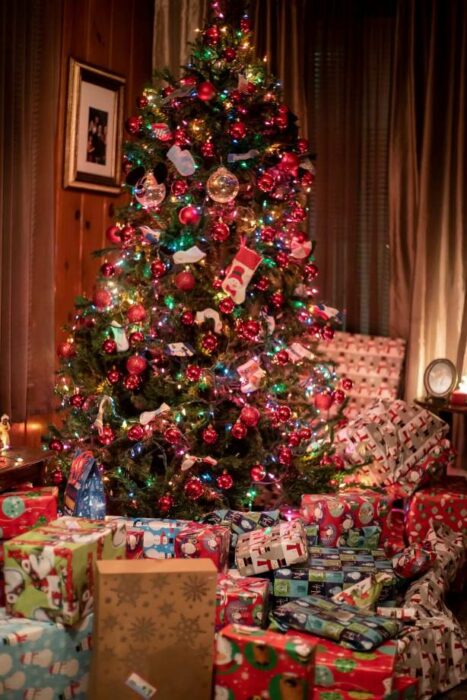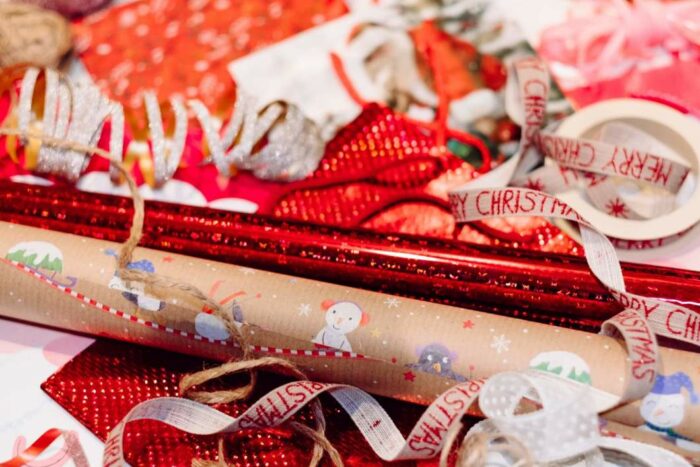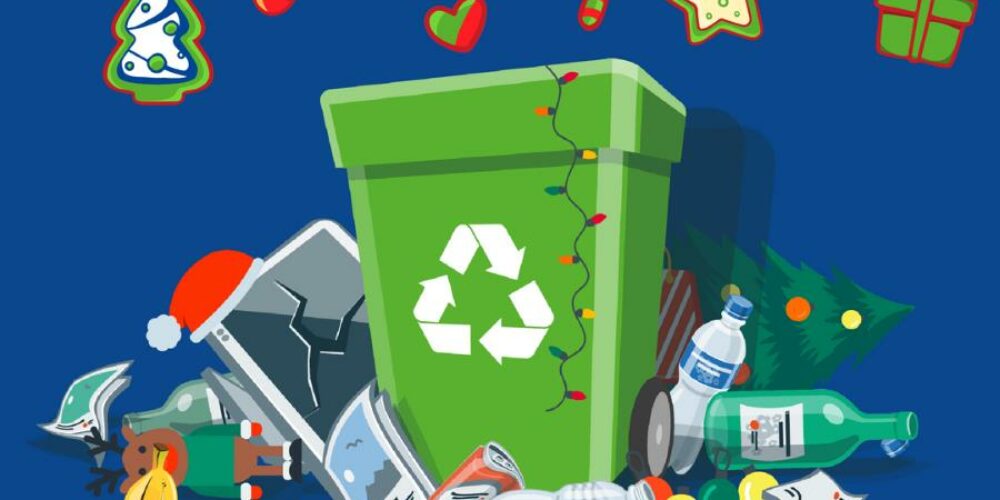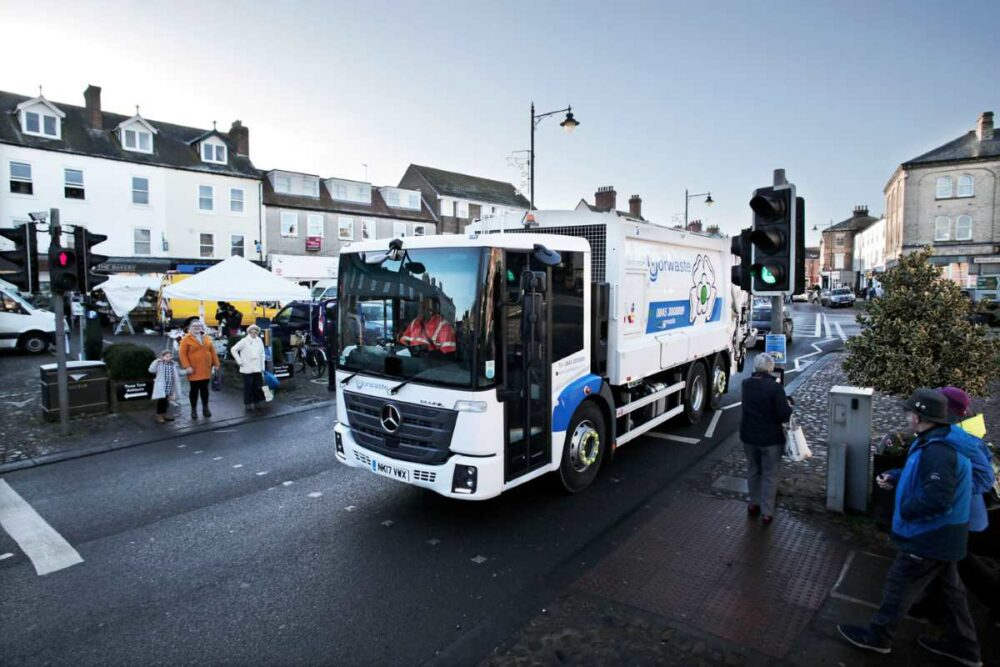How to reduce waste at Christmas
At Yorwaste, we’re as committed to reducing waste as we are recycling it. Christmas is a time for mass consumption – the value of seasonal sales is forecasted to be £82 billion in December 2022, the highest in Europe. With that, comes a huge increase in everything from food and packaging waste, to discarded Christmas trees, unwanted gifts and rejected decorations.
In fact, around an extra 30% of rubbish, or around three million tonnes, is produced and discarded throughout the festive period when compared with the rest of the year, with significant implications for both the environment and household budgets. Time for a rethink…
In this blog, we outline some of the most astounding UK Christmas waste facts, along with our expert Christmas waste tips on the small steps households and individuals can take to reduce waste this Christmas. From getting a zero waste Christmas tree to plastic free gift ideas, we’ll cover all the zero waste tips you’ll need to know to wate less this Christmas. Merry waste-free Christmas!
How to reduce waste at Christmas:
- Utilise you leftovers
- Compost peelings and leftover raw veggies and fruit
- Use eco-friendly Christmas decorations
- Recycle your Christmas tree
- Buy a genuine pot grown tree or a plastic free Christmas tree
- Fix and reuse broken fairy lights
- Remove plastic bows and ribbons (to reuse) before recycling wrapping paper.
- Avoid cards or paper with glitter as this cannot be recycled.
- Try eco-friendly wrapping paper alternatives
- Inform people you’re not sending cards – and instead making a donation to charity.
- Avoid tipping glitter down the sink
- Recycle Christmas crackers
- Buy eco-friendly Christmas crackers with sustainable gifts and materials.
- Make your own Christmas crackers
- Regift – the best way to recycle
- Sell unwanted gifts
- Buy vouchers or gift cards
Food waste
It’s been reported that in recent years that, at Christmas, UK households waste 740,000 Christmas puddings, two million turkeys, and 7.4 million mince pies annually. At the same time, food poverty is a growing issue, with almost 4 million children in the UK living in households that struggle to afford to buy enough fruit, vegetables, fish and other healthy foods – an incentive to change if there ever was one.
Christmas food waste – the facts
- 2 million sprouts, 7.1 million pigs in blankets, 9.8 million cups of gravy and 9 million carrots were also estimated to be thrown away.
- Each UK household spends about £169 on food shopping for Christmas, with seven-in-10 people admitting to buying more food than they need.
- Last year, it was estimated that more than 4.2 million Christmas dinners were scraped into the bin.
- 1kg of food waste in landfill equals around 2.5 kg of CO2 gas.
How to reduce Food Waste at Christmas:
- Take a common sense approach. Morrisons has just scrapped dates on its fresh fresh fruit and veg to encourage customers to use their own judgment and reduce waste this Christmas.
- Buy loose. Purchase what you need rather than ‘cheaper’ huge bags.
- Plan ahead. Think carefully and realistically about every aspect of your household’s food needs, from snacks to the main event.
- Love your leftovers – with good storage, most surplus food can make it into a new meal. Work potential leftovers into your Christmas meal plan. Think sandwiches, smoothies, soups and stocks
- Compost – peelings and leftover raw veggies and fruit should go into the compost bin
Decorations & Trees

Approximately 500 tonnes of Christmas lights are thrown away each year, along with 8 million Christmas Trees. So, should ‘less is more’ be our new Christmas decorating mantra:
Christmas decorations and trees – the facts
- Tinsel is made of plastic which cannot be recycled, so it ends up in landfill.
- Christmas lights can be recycled at your local household recycling waste centre
- A 2m artificial tree has a carbon footprint equivalent to 40kg of greenhouse gas – if you have an artificial tree at home you would need to reuse it for at least 10 Christmases to keep its environmental impact lower than that of a real tree
- Around six million real Christmas trees will end up in landfill. For a two-metre plastic free Christmas tree with no roots, the carbon footprint is equivalent to 16kg of greenhouse gas emissions if it ends up in landfill.
- Evidence has shown that although artificial Christmas trees can be reused, a real Christmas tree is more environmentally friendly – although the artificial Christmas trees may be reused, they are a linear economy product as their end of life ultimately is in the landfill, whereas real Christmas trees are biodegradable and compostable.
- If you have an eco-friendly Christmas tree with its roots still attached, then replanting your Christmas tree is a great way to reduce your carbon footprint and help the government’s effort to plant more trees.
Zero waste Christmas decorations and Trees
- Try zero waste Christmas decorations instead of tinsel, such as tasteful, homemade festive pom poms, garlands and bunting
- Some household recycling waste centres recycle real Christmas trees, or they can be made into fish food or firewood
- Better still, think longer term – buy a genuine pot grown tree or a good quality fake that will last-and-last
- Fairy lights can be fixed – with a little determination, patience and googling.
- You can recycle Christmas trees, free of charge, at household waste recycling centres. Real Christmas trees can be placed in the site’s garden waste skip where they will be shredded and composted. Depending on what they are made of, artificial Christmas trees can be placed in either the small appliance, scrap metal or plastic reuse containers.
Wrapping paper & greetings cards

The average UK household will get through four rolls of wrapping paper and a roll and a half of sticky tape at Christmas. Apparently, that adds up to 227,000 miles of paper and 40 million rolls of sticky tape – most of which will end up in the bin. Additionally, an average of 24 Christmas cards will be discarded once the festive period is over. It’s worth noting that wrapping paper or cards that contain glitter cannot be recycled.
Cards and wrapping – the facts:
- It takes 1 tree to make 3,000 Christmas cards.
- 1 billion Christmas Cards will end up in bins – the equivalent of 33 million trees
- Wrapping paper which is laminated, contains glitter or is very thin with few fibres, isn’t suitable for recycling.
- The equivalent of 108 million rolls of wrapping paper will be thrown out at Christmas.
- Glitter, which features on many Christmas cards and other festive items, is a micro plastic. Meaning like all non-bio plastics it does not naturally biodegrade.
Change your habits to reduce cards and wrapping waste:
- Remove plastic bows and ribbons (to reuse) before recycling wrapping paper.
- If wrapping paper holds its shape when scrunched into a ball, it’s recyclable; if it springs back, it’s not
- Avoid cards or paper with glitter as this cannot be recycled.
- Try eco-friendly wrapping paper alternatives, like brown paper with festive stamps, or newspaper with natural embellishments, like a sprig of holly.
- Inform people you’re not sending cards – and instead making a donation to charity.
- There is no current legislation obstructing the sale of glitter products and the responsibility lies with the consumer, so this Christmas, avoid using/buying greeting cards, crafts and decorations with glitter.
- If you do happen to use glitter this Christmas, avoid tipping glitter down the sink. Glitter you cannot store or reuse should be disposed of as general waste.
Christmas Crackers
Environmental activists are calling for the traditional Christmas cracker to be banned as they contribute to plastic waste. Are you prepared to let your Christmas go off without a bang?
Christmas crackers – the facts
- Crackers are responsible for a large contribution of plastic waste to landfill every year.
- It is estimated that over 40 million Christmas crackers end up in the bin on Christmas Day.
- Tesco’s own-label crackers are plastic-free for the first time. This includes non-plastic presents inside.
Change your habits to reduce Christmas cracker waste:
- Christmas crackers can be recycled along with any other cardboard products as long as they’re not foil-coated or glittery.
- Buy eco-friendly Christmas crackers with sustainable gifts and materials.
- Better still, make your own.
Unwanted gifts

- Over 21 million of us receive at least one unwanted gift each Christmas
- On average, £41.70 is being spent on each of these disliked presents
- 5 of us regift these unwanted presents, followed by those who donate them (21.87%)
- More than 4 million people returned an unwanted Christmas gift last year.
- It’s estimated that 23 million unwanted gifts ended-up in landfill last Christmas. That adds up to approximately £42 million of wasted money.
Change your habits to reduce unwanted gifts waste:
- Donate it – charity shops and local initiatives collecting gifts and items for individuals or families experiencing hardship, such as Yorwaste’s Reuse Santa Appeal, are everywhere. Do be aware that some items are not suitable to donate, such as perishables and some electrical goods
- Regift – the best zero waste Christmas gift – just make sure you don’t give it back to the person who bought it for you.
- Sell it – on sites such as gumtree or eBay.
- If you’re buying gifts – if you’re not sure, buy vouchers or consumables you know they enjoy, simply ask people what they’d like or join forces with another person who knows them better to get them a better-quality present you know they’ll love.
Packaging
It is estimated that three-and-a-half black bags full of packaging will be thrown out per household. This means that approximately 100 million black bags full of packaging from food & drink, toys and gifts are discarded. So, what can we do to reduce this waste?
Packaging – The facts
- It’s been reported that 125,000 tonnes of plastic wrapping used for food will be discarded over the festive period.
- 80% of toy packaging is usually made from both paper and card – both of which are fully recyclable
- 13,350 tonnes of glass is binned every year during December and January.
- Six in ten people say they don’t feel guilty about what they throw away over the festive period.
Change your habits to reduce packaging waste
- Recycle – every council in the UK will accept paper for recycling, whilst 98% will accept cards for recycling too.
- Use your household waste recycling centres (HWRCs) – if your recycling bin is full, there’s always another option. Plus, HWRCs take a wider variety of waste than you can usually place into your domestic recycling bin.
- Ask for and give items with less packaging – homemade gifts, books or items from independent makers fairs all tend to incorporate less packaging.
- Consider packaging when buying food. Buying loose items or using food markets or independent retailers will help you reduce food & drink packaging
Additional Sources
https://www.gwp.co.uk/guides/christmas-packaging-facts/
https://www.ecoandbeyond.co/articles/christmas-food-waste
https://toogoodtogo.org/en/movement/knowledge/the-carbon-footprint
https://www.phswastekit.co.uk/blog/posts/20-11-2018/how-much-waste-does-the-festive-season-create

